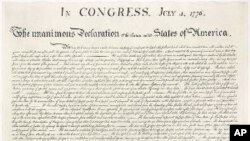Although the National Archives in Washington, D.C., is rapidly adjusting to the computer age, it is best known as the home of America’s priceless paper documents.
The magazine U.S. News & World Report invited citizens to rank America’s top-100 historic documents, as selected by the archives’ curators. The archives then published a book called "Our Documents," which describes these paper treasures in detail.
Not surprisingly, the 1776 Declaration of Independence from Britain, and the U.S. Constitution - both of which visitors come from around the world to view at the Archives - finished one-two in Americans’ esteem. Each got more than 27,000 votes.
Other landmark documents such as President Abraham Lincoln’s Emancipation Proclamation of 1863, which declared that slaves in the rebellious southern states “are, and henceforward shall be, free,” rounded out the top 10.
If you’re curious which document came in last - number 100 - it’s the De Lome Letter, which got all of 97 votes. Quite frankly, it’s so obscure that we’d never even heard of it. But here’s the story of the De Lome Letter:
In 1898, Enrique De Lome, Spain’s minister to the United States, sent a letter to a friend in which he said U.S. President William McKinley “is weak and catering to the rabble.” Someone intercepted it and snuck a copy to newspaper publisher William Randolph Hearst. He printed it, fanning the flames for what became the Spanish-American War.
These days, when supposedly secret or private letters and conversations routinely find their way into the public eye, it seems fitting that a leaked letter would round out the list of America’s greatest documents.




